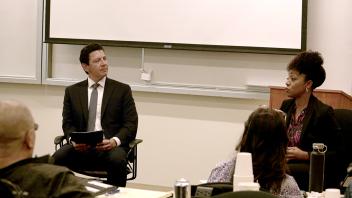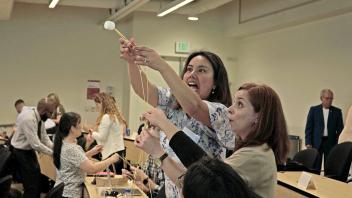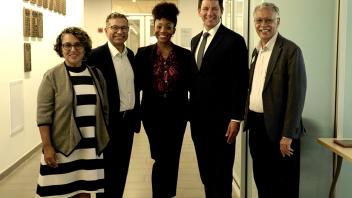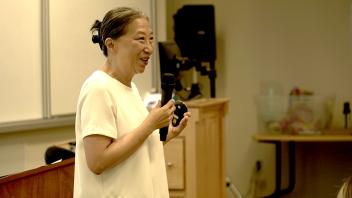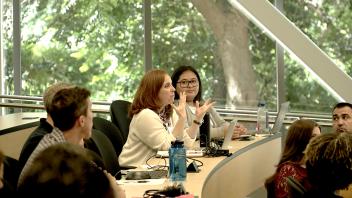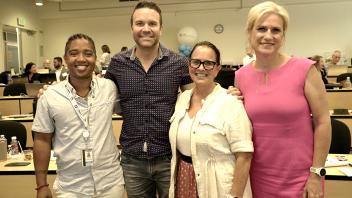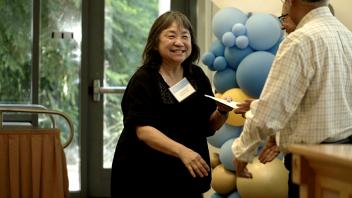Innovation in Public Service: Preparing our next generation of leaders
In July 2023 the inaugural UC Leadership Academy brought together 30 government leaders from 19 counties across our rich and diverse state.
The aim: to support their growth as managers and advocates for their communities today—and in the future.
As Joe DiNunzio, executive director of the UC Davis Mike and Renee Child Institute for Innovation and Entrepreneurship, noted: "Each of us has our own hero's journey, the impact we have on the world."
The highly selective academy for county assessor, recorder and elections office personnel offered a deep immersion that integrated lectures, facilitated conversations and workshop exercises. It kicked off with shared insights and welcomes UC Davis Graduate School of Management Dean Rao Unnava and Betty Yee, past state controller and vice chair of the California Democratic Party.
Joaquín Torres, San Francisco assessor-recorder, led a conversation with Malia Cohen that delved into her career from San Francisco supervisor to California State Controller and explored her views and insights into courage, collaboration, leadership, the power and importance of equity, and the power and essential honesty of the network.
In the following days, Graduate School of Management professors led deep dives into the situational theory of leadership, becoming a trusted leader, building and leading great teams, and meaningful feedback in diverse workplaces and communities.
Leadership is about outcomes. When something good happens, it happens because the others you are working with made it happen. Focus on how you can facilitate to help your team members achieve something positive. This is the only way to move forward."
—Rao Unnava | Dean | UC Davis Graduate School of Management
Panel discussions and conversations built on this framework. Public service leaders from across the state and officials representing the California Assessors' Association (CAA), County Recorders' Association of California (CRAC) and the California Association of Clerks and Election Officials (CACEO) offered a candid, real-world look at how successful public servants lead their teams and navigate the challenges of their work.
And throughout, participants connected, shared experiences, grew their networks—and explored with each other how the leadership knowledge and insights they were gaining would deepen the impact of their work with their teams and in their communities.
A New Generation of Change Agents
Joe DiNunzio, executive director of the UC Davis Institute for Innovation and Entrepreneurship, and Jesse Salinas, assessor, clerk-recorder and chief election official for Yolo County, collaborated to create this academy. They discuss its need, its impact and more.
What is the genesis of the Leadership Academy?
Joe DiNunzio: The institute has a longstanding commitment to engage with the community beyond the walls of the university, including hosting academies for leaders in the National Labs and at Historically Black Colleges and Universities. When Jesse first brought up the idea of a program for leaders in county and state government, we saw a fantastic opportunity to share our experiences and insights with a group of public servants committed to being change agents. Critical to our ability to make it a reality was strong support from the dean of the UC Davis Graduate School of Management, Rao Unnava.
Jesse Salinas: Some five years ago when I was serving as president of the Bay Area Assessors Association, I shared with my colleagues the need for leadership training that was more than just a typical supervisor or managerial training. They referred me to an assessor leadership program that was established with Stanford University back in the 1990s and then transferred to the University of the Pacific (UOP) in the early 2000s. After looking at the curriculum, it was apparent to me that a new and more dynamic training approach was needed.

Why a Leadership Academy in California and why now?
DiNunzio: Our goal with the academy is to provide hands-on opportunities for current and future leaders in California to learn how to more effectively guide their teams and serve their communities. This is particularly important as a new generation of leadership moves up to the workforce and California continues to become more diverse across all measures. Central to our approach is helping participants embrace a “growth mindset”—recognizing and embracing a focus on continuously building new skills and relationships to help each evolve as a leader throughout their career.
Salinas: The challenges facing leaders in public service have been elevated to new levels since 2016. For example, there has never been a more challenging time to be a leader in the elections field. In addition, the recent pandemic shifted the landscape dramatically in terms of how we lead organizations and our staff, and how we engage the public. The ability to successfully network and collaborate with colleagues across the state is essential in our fast-paced society, with the changes taking place on a daily basis.
"The academy helped me learn new concepts of leadership styles, working groups and the importance of networking. I left inspired to make a difference in the work I do everyday and to inspire others to growth with me."
Greta Arevalo, MPA | Program Manager, Vote by Mail Services | Monterey County Elections Department
What are the benefits of growing the partnership between the state of California and the UC system?
DiNunzio: There is a compelling opportunity to leverage the deep and insightful leadership research by UC Davis faculty to support our colleagues in state government, who serve 40 million fellow Californians. While this initial academy is a pilot, our mutual goal is to build ongoing relationships across the organizations that will enable us to develop and deliver impactful programs that support the ability to attract, retain and support successful leaders throughout the state.
Salinas: UC Davis is a world class institution located right here in our own Yolo County. And the strong support of Dean Unnava and his staff, including Professor DiNunzio, have provided this partnership has been tremendous. The talents and resources available to future and current leaders through this partnership with the Graduate School of Management across all these different fields and associations is unique. This Leadership Academy has been expanded beyond the training previously offered through Stanford and UOP to include clerks, recorders, election officials and leaders at the state Board of Equalization.
What is the power of the network?
DiNunzio: Core to our approach to teaching leadership and innovation is a focus on building, growing and drawing on a powerful network. We help students understand that such a network is central to being able to have the impact they want to have on the world. Jesse and I also live it—“do as I do”—investing in time and effort to build relationships both within and across our professional realms.
Salinas: I believe this broader-based network will provide an opportunity for cross-pollination of new ideas across the state. As Yolo County’s assessor/clerk-recorder/elections (ACE) official, I have found that having conversations and close relationships with colleagues from different fields across the state has stimulated innovation and insights that would not have been possible otherwise. In addition, the insights provided from private sector leaders and world class professors will no doubt create other possibilities for service improvement and innovation across the state in these different fields.
What’s at stake if we don’t innovate in the public service sector?
DiNunzio: There are myriad opportunities to innovate in public service and drive positive impact in California communities—something we learned first hand in the case study we developed with San Francisco Mayor London Breed recently. We believe that in partnership with our colleagues in senior leadership roles in the state, we can provide tools, resources and relationships to help public servants strengthen their ability to identify challenges, propose novel solutions, and work with their teams and communities to deliver them.
Salinas: Innovation can't be just something we say we do. Rather, we must demonstrate it in our daily actions. Innovation in all sectors requires strong leadership and an effective team to execute it successfully. If we are truly committed to public service, ongoing innovation is needed at all levels and should not be viewed as a “nice to have when possible,” but instead a required mindset to ensure we are providing the best possible services to our public now and in the future.

